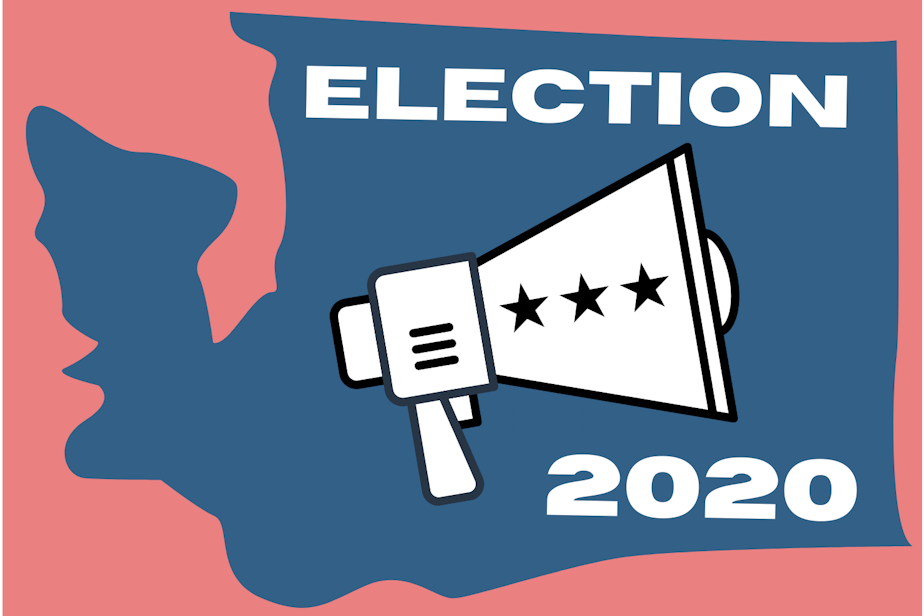Election anxiety stressing you out? We asked a psychiatrist about how to cope

Are you feeling stressed about the presidential election? With the pandemic and everything else going on right now, chances are you might be.
Dr. Doug Zatzick is a professor of psychiatry and behavioral sciences at the University of Washington, and a practicing psychiatrist at Harborview Medical Center. He joined KUOW to share some practical advice on what to do about election stress.
I think there's just a tremendous amount of uncertainty. There's the coronavirus pandemic, there's been social unrest in 2020. We've had bitter political divides, over the Supreme Court most recently, and now you've got this upcoming election. It's only natural, as human beings —when there's this much cumulative uncertainty — to experience anxiety and stress.
First, trying to understand oneself, and be aware of oneself, and what one's triggers are [are coping strategies]. One additional thing to think about is that this is sort of an anniversary event. Whenever there's something stressful or a traumatic that happens ... if I were in a motor vehicle crash, a year later, I might have memories or heightened emotions related to that injury.
Similarly, so much of what has occurred over the past four years has really been unpredictable. I was just thinking back, personally, because I was able to come to your KUOW studio and do an interview with Bill Radke.
We wondered about what the impact might be on recent immigrants to the United States or refugees if a Republican president was elected, but who could have imagined, four years later, that parents and children would be separated at the border, and there'd be hundreds of kids who couldn't be reunited with their parents.
Sponsored
The sort of unfathomable things that have happened over the past four years really lead to this cumulative burden of uncertainty. So I think the first step is to take stock individually: What regulates me? What stresses me out? What kind of changes have occurred within me?
I think this is something a lot of folks are experiencing. It really does take a comprehensive approach. Turning to some sort of introspective practice, like yoga or meditation, can be an excellent step for a lot of people. But you may have to do more.
I want to contextualize these comments. I'm going to talk about maybe eating right, and comfort food, but I understand there may be folks who don't have those sort of luxuries. You really have to take this in light of your own context, and think about these recommendations.
Especially over the next week or so, if we're just talking about the election stress, the first thing is to maybe be aware, but also acknowledge that the results of the election may not be known next Tuesday, or even Wednesday morning. This may prolong itself. It may be days or even weeks before we know.
Sponsored
So, thinking about that, what are the things I can do looking forward? Eating right, or even indulging, comfort food, exercising, introspective practice. What are the positive social relationships and influences that I have going, pandemic willing? Who can I be in contact with?
Really thinking through, seriously and fastidiously, what the next few weeks might look like, and how you can get a combination of things going that are supportive and help regulate you.
I think it's going to be hard for any of us not to tune into election results next Tuesday, or Wednesday morning. But maybe having a couple of really solid sources, and really reining in a tendency to surf social media.
The anxiety drives obsessions, recurring thoughts. Do you find 45 minutes and hours just disappeared, looking at election results? You really want to try and rein that in. Maybe turn off news notifications on your phone. That's really a smart initial strategy in terms of the "don'ts."
Sponsored
I am getting exercise. I do have an introspective practice that I turn to every morning, a meditation practice. And I really am trying to stay connected with friends and family.
I also am letting myself have sort of a ray of hope that there will come a time for our country when we can heal the divides of the past four years — not in a pollyannaish way, but sort of move ahead. It may not be in the next few days or weeks, but maybe 2021 will bring more of a common sense of unity going forward.
Listen to the interview by clicking the play button above.





